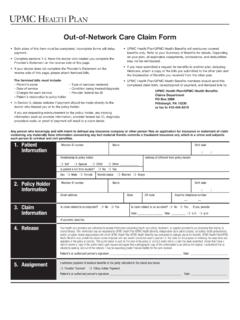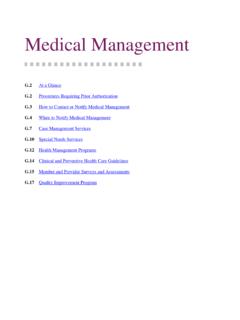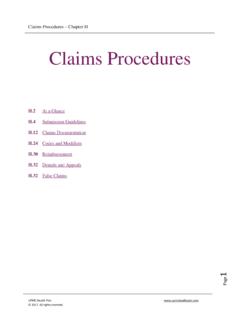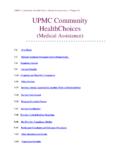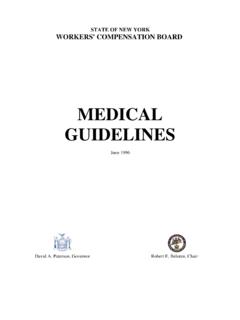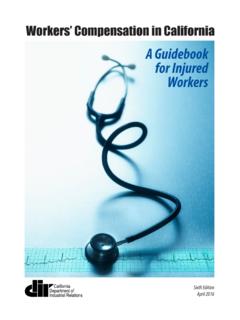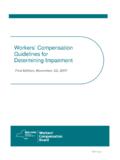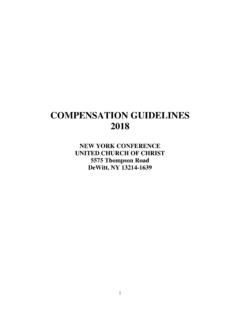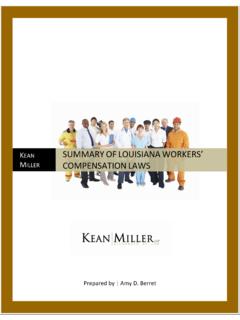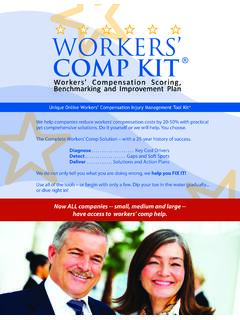Transcription of Workers’ Compensation Provider Billing Guidelines ...
1 Workers Compensation Provider Billing Guidelines Billing transactions are covered under Chapter 127 ( through ) of the Workers Compensation Act (the Act) for the State of Pennsylvania: Workers Compensation Medical Cost Containment rules and regulations. All of the information contained in this document relates to the focus of the PA Workers Compensation Act, which is to insure that injured workers receive quality, timely medical treatment and that providers are paid promptly and correctly. Additional information can be found on the PA Bureau of Workers Compensation website: Key Points: Injured Workers Rights Injured workers are not to be billed or sent statements.
2 Injured workers are not to be made responsible to determine insurer information. Injured workers are not to be billed the difference between the total billed and the reimbursed amount under the PA Workers Compensation Fee Schedule. Key Points: Submission of Bills Health Care Providers are defined by the Act as those licensed or otherwise authorized by the Commonwealth to provide health care services .. Health Care Providers are required to submit Billing and reports as defined in the Act if they wish to be paid for services rendered. If an employer is covered by an insurer, the Provider shall submit the report to the insurer (payer). An insurer is either an insurance carrier or a self-insured employer entity.
3 O Self-insured employers are determined by the Bureau of Workers Compensation and hold unique Bureau Codes. o Self-insured employers may pay bills directly or utilize a Third Party Administrator (TPA). o Deductible policyholders are not self-insured. It is the Provider s responsibility to determine the payer. Key Points: Documentation Providers are required to submit (1) properly coded bill(s), (2) an LIBC-9 Medical Report Form, and (3) medical records to the payer. o The LIBC-9 Medical Report Form tutorial is found at o The above information shall be submitted within ten (10) days of commencing treatment and at least once a month thereafter, as long as treatment continues.
4 Providers are required to use appropriate Billing forms (HCFA 1500 or UB92 or any successor forms required by HCFA for submission of Medicare claims). Workers Compensation Provider Billing Guidelines Part B providers must use current HCPC/CPT coding and codes must be properly documented. o AMA/CPT Guidelines should be used to determine if documentation of a code meets the requirements. o ACS and PA EMS Trauma Guidelines should be used for trauma Billing . Part A providers must use Service Codes contained in the most recent Bureau Charge-master. Until a Provider submits Billing on one of the standard forms, insurers are not required to pay for the treatment billed.
5 Key Points: Reimbursement Once the bill, LIBC-9, and records are properly submitted, the insurer/self-insured has 30 days to pay, deny, or challenge via Utilization Review Process (Section ). o For purposes of computing timeliness of payments, the insurer shall be deemed to have received a bill and report 3 days after mailing by the Provider . Payments shall be deemed timely if mailed on or before the 30th day following receipt of the bill and report. The insurer to whom the bill is submitted shall calculate the proper amount of payment for the treatment rendered. The insurer (and if used, the re-pricing company) must make payments utilizing PA Workers Compensation Fee Schedule calculations reflected on an Explanation of Benefits (EOB).
6 The EOB must be itemized as the Provider s bill is itemized (no grouping). All EOBs shall contain the following notice: Health care providers are prohibited from Billing for, or otherwise attempting to recover from, the employee, the difference between the Provider s charge and the amount paid on this bill. Key Points: Denials and Appeals, Grievance Process, and Fee Review Billing may be denied by an insurer for a variety or reasons: o No claim on file o Injured worker not an employee of the company o Treatment not causally related to report work injury o No documentation provided, but required to process payment If a Provider feels he or she has received a denied bill in error from WorkPartners, the Provider is encouraged to contact the WorkPartners Manager of Network Services at 1-800-633-1197 to discuss his or her concerns and request a first level review.
7 Workers Compensation Provider Billing Guidelines Key Points: Bureau of Workers Compensation Fee Review Process The only dispute resolution process provided by the Act is the fee review process through the PA Bureau of Workers Compensation . The fee review process belongs to the Provider . Fee reviews may be filed for timeliness, amount, or both. Requires the Bureau to contact the insurer to obtain information. This is the payer s opportunity to provide information. Fee review decisions are provided to all parties. Interest due on a fee review shall accrue on the due and unpaid balance at 10% per annum on the unpaid balance. A fee review can be appealed by either party to the Fee Review Hearing Officer.
8 Fee Review FAQs Q. Are there time constraints for filing a fee review? A. Yes. A Provider may file an application for fee review within 90 days from the original Billing date of treatment, or 30 days from a notification of disputed treatment, whichever is later. Q. If a Provider does not agree with the decision received from the Bureau, should the Provider call the staff to discuss the decision? A. No. The Fee Review Section cannot discuss any decision that it has issued. Providers may, however, appeal decisions as outlined therein. Q. The fee schedule on the Bureau s website contains a 0 in the fee schedule amount column for the CPT code for which I am Billing .
9 Does this mean that the service is not reimbursable? A. No. Payment is to be made pursuant to Section of the Workers' Compensation Medical Cost Containment Regulations (Regulations). Please note that a usual and customary charge database has not been adopted by the Bureau. Q. Do the same rules apply to Site of Service? A. Site of Service only applies when: A Provider bills with place of service 20, 21, 22, 23 or 24 -and- There is an amount listed in the site of service column. If no amount is listed in the site of service column, reimbursement will be at the fee schedule amount. Q. May I bill with a temporary code? A. You may; however, the Regulations do not recognize the use of temporary codes.
10 Therefore, they will not be found on the fee schedule. Q. Why must I submit a new fee review application with each submission? Workers Compensation Provider Billing Guidelines A. If your application is returned to you as incomplete, a new Application for Fee Review, LIBC-507, with an updated proof of service to the insurer is required. The insurer, as listed on the LIBC-507 (Insurer block), has also been notified that your fee review application was returned to you as incomplete. You must complete a new LIBC-507 showing the new date on which you served the insurer with another copy of the application and attached documentation, per Section (b) of the Regulations.


